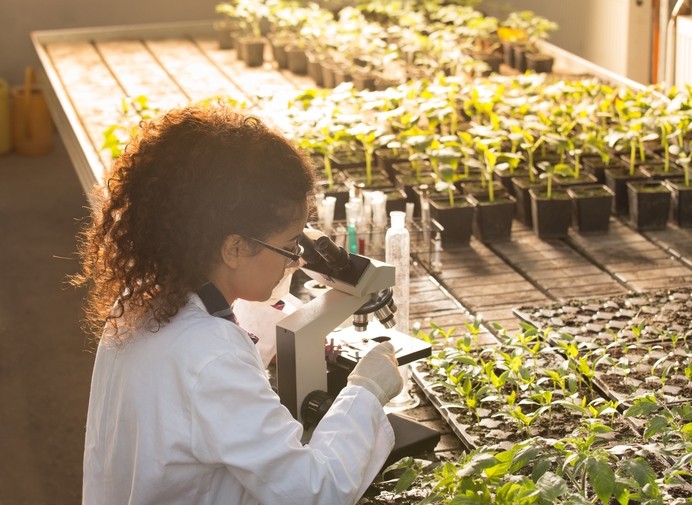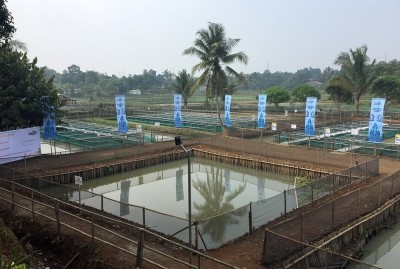US company Ginkgo Bioworks talks feed innovation

The Boston-based Ginkgo Bioworks designs custom microbes for use in multiple areas including producing cultured ingredients, improving strain production and developing novel enzymes, the company reported.
The firm wants to use engineered biology to achieve the largest benefit, said Leigh Fritz, director, business development at Ginkgo. To address this goal it has been partnering with companies to help build the technology they need to bring products to market.
“Our primary market is anyone looking to leverage biology as a source of sustainable innovation,” she told FeedNavigator. “We currently work with agriculture, food and nutrition, pharmaceuticals and engineered probiotics, and specialty and commodity chemicals – though we’re always eager and open to exploring new applications of synthetic biology.”
The process may start with a specific goal in mind or use a more evolutionary technic the way a plant breeder might.
“Many of our projects involve engineering the metabolism of a microbe so they produce a key product during fermentation, for example specialty chemicals like enzymes and food ingredients,” said Fritz. “For projects like this we start with a target and work to build or improve an organism that can produce it, by designing DNA sequences encoding a new enzyme pathway.”
However, if the goal was to improve a specific enzyme involved in the production of a particular metabolite, the process could include an approach focused on “directed evolution,” she added.
Designing biology and GMO efforts
Ginkgo was the brainchild of a team of graduate students at the Massachusetts Institute of Technology (MIT) along with their professor.
“We believe biology is the most advanced and powerful technology available – imagine if our products could grow and decompose sustainably the way a plant does, or if our gadgets could heal themselves like living things do,” she said. “Because of this power to grow, biology is poised to change the way we tackle challenges in manufacturing products, growing food, producing new kinds of medicines, and doing it all sustainably.”
The company also is looking to help reclaim the use of the term 'GMO' or genetically modified organism because of the potential the technology provides, she said.
“Genetic engineering is already making a huge difference in people’s lives, whether it’s because of life-saving biologic medicines, optimized enzymes for animal feed, or in helping to make agriculture more sustainable and food more nutritious,” she said. “We see these as opportunities to celebrate GMOs and to invite people to rethink their preconceived notions about the technology.”
However, the company does understand that there could be reasons why people are uncomfortable with GMOs or with the way that the technology has been deployed, said Fritz. “We want to be able to celebrate what this technology makes possible as well as give people the tools to make informed decisions about the products they use,” she added.
Feed potential and partnerships
Some of the company’s previously announced projects and partnerships include work on custom microorganisms with ADM, on bio-industrial fermentation with Cargill and a joint venture with Bayer called Joyn Bio, said Fritz. The project looks to engineer plant probiotics.
“One of the projects Joyn is focusing on is developing microbes that can reduce the need for artificial fertilizers and lead to more sustainable agriculture,” she said. “These kinds of microbes, built on Ginkgo’s platform and leveraging Bayer’s expertise in agriculture will be able to bring this important technology to the market.”
Additionally, there is promise for development within the animal nutrition industry as the successful use of biotechnology-based products has already started, she said. Industry improvements that make use of those type of advancements include the use of amino acids and feed enzymes that are added to improve feed use or nutrient uptake.
“Synthetic biology is being used effectively today to improve the production and efficacy of products in these existing areas,” she said. “We also see tremendous potential in deploying our technology to generate novel products that could enable producers to address a greater range of challenges, including mycotoxin infection of grain and the overuse of antibiotics.”
The reduction of antibiotic use remains a challenge for animal producers as they examine ways to improve animal health and productivity, said Fritz. “Synthetic biology also has great potential to help facilitate a reduction in antibiotic use through the production of a diverse range of feed ingredients that can support healthy gut function and immune health, such as bioactive peptides, prebiotics, and components of essential oils,” she added.
Similarly, accounting for the presence of mycotoxins in feed, or reducing their production could be an area of future focus, she said.
“Unfortunately, the incidence of mycotoxins globally is expected to increase due to a variety of factors, most particularly climate change,” she said. “We see synthetic biology as a new tool that has the potential to have a significant impact in developing solutions that minimize the occurrence and impact of mycotoxins across the value chain, from farm to crop processor to animal to table.”
Looking forward
At the end of 2017, the company collected $275m in series D funding. However, that does not appear to be the end of the ongoing work the company is pursuing.
The current efforts are expected to expand, said Fritz. Ginkgo is in the process of opening its fourth foundry, or area where strain engineering is done, and to continue expanding its lab space and design abilities.
“We’ve also had a lot of success over the past year introducing the power of synthetic biology to new industries, from agriculture to pharmaceuticals to companies in the specialty chemicals space,” she said. “We plan to expand further, helping companies across industries rethink traditional ways of manufacturing and realize the potential of biology to make their supply chain more affordable and more sustainable.”















